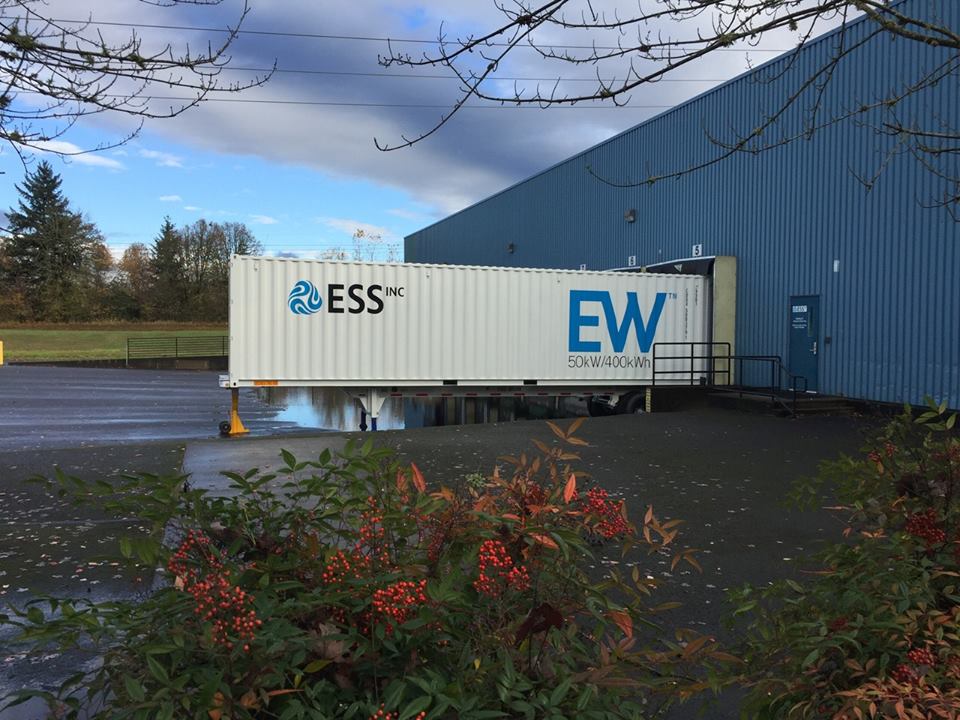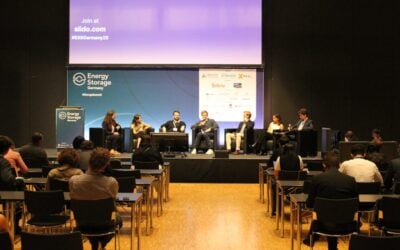
ESS Inc, US manufacturer of a novel iron flow battery for stationary energy storage applications, has entered the German market via an agreement with investor, chemical company BASF.
The company’s ‘all-iron’ batteries, housed and sold in a solution called Energy Warehouse, are intended to offer long durations of energy storage beyond the limits of around 2-4 hours typically seen in grid or commercial-scale lithium battery storage.
Enjoy 12 months of exclusive analysis
- Regular insight and analysis of the industry’s biggest developments
- In-depth interviews with the industry’s leading figures
- Annual digital subscription to the PV Tech Power journal
- Discounts on Solar Media’s portfolio of events, in-person and virtual
ESS Inc claims it can comfortably go beyond six hours and is also suitable for microgrids. Durability advantages give it a potential 20,000+ cycle life, approximately over 20 years of operation. ESS said it also responds quickly to signals and the company offers full turnkey installation services. The battery’s proprietary electrolyte is made with iron, salt and water.
Beginning of ‘working relationship’ with chemicals giant BASF
In December, Energy-Storage.News reported that Germany-headquartered multinational chemical company BASF was among investors in a US$13 million Series B funding round for ESS Inc, which is BASF’s latest stake taken in the energy storage market following a lithium battery raw materials supply deal with Norilsk-Nickel, and a collaboration on EV battery production technology with the Centre for Solar Energy and Hydrogen Research Baden-Württemberg (ZSW).
During last week’s Energy Storage Europe show, ESS Inc, from Portland, Oregon, announced that it will now deliver two Energy Warehouse units, each of 50kW / 400kWh for BASF facilities in an arrangement that BASF New Business head of sales and marketing Olaf Rogge said would “create a working relationship that will enable us to gain first-hand experience with the technology”.
“We look forward to collaborating on energy storage applications and learnings in the future,” Rogge said.
Craig Evans, CEO of ESS Inc, told Energy-Storage.News that there will be other broader synergies and a close working relationship with BASF and said “we are working on broader partnership opportunities as we speak”.
The projects are ESS’ first European venture and CEO Evans said that he saw the continent as “one of the most dynamic markets for renewable integration”. The units are being tested and piloted with clients for “renewable energy integration, demand response and load-levelling applications”, Evans said.
The units will be shipped this summer and installed “later this year” and while they will not be configured so that future applications can be added, they will be scalable if more battery capacity needs to be introduced. Along with a claimed low levelised cost for its products, ESS the iron flow battery systems can not only hold long durations of storage but also to deliver applications including “renewables integration, time shifting, demand charge reduction, infrastructure support, to limiting reliance on generators.”
“Because of its ability to support multiple use cases, it has the potential for revenue stacking, a unique advantage for long term projects,” Craig Evans said before iterating what ESS believes to be advantages over more established competitors.
“The fact that we have a much cleaner product sets us apart from other players in the industry including lithium ion battery manufacturers and vanadium flow battery providers. Not to mention our advantage in levelised cost and unlimited cycling with no degradation for 20+ years.”






